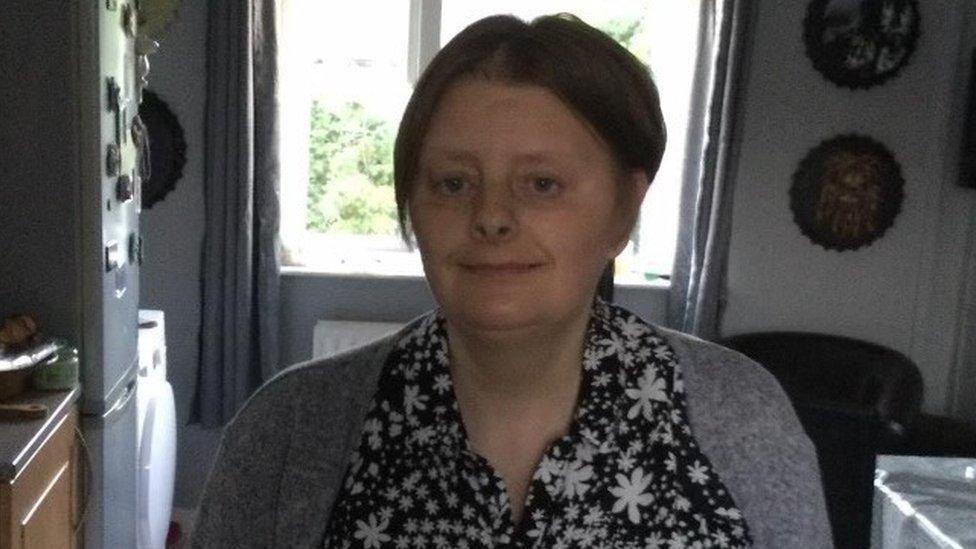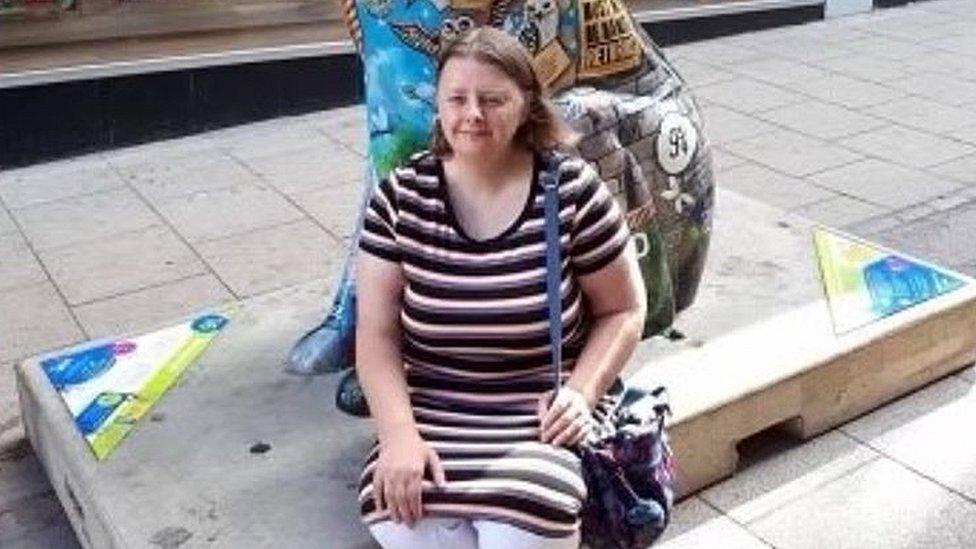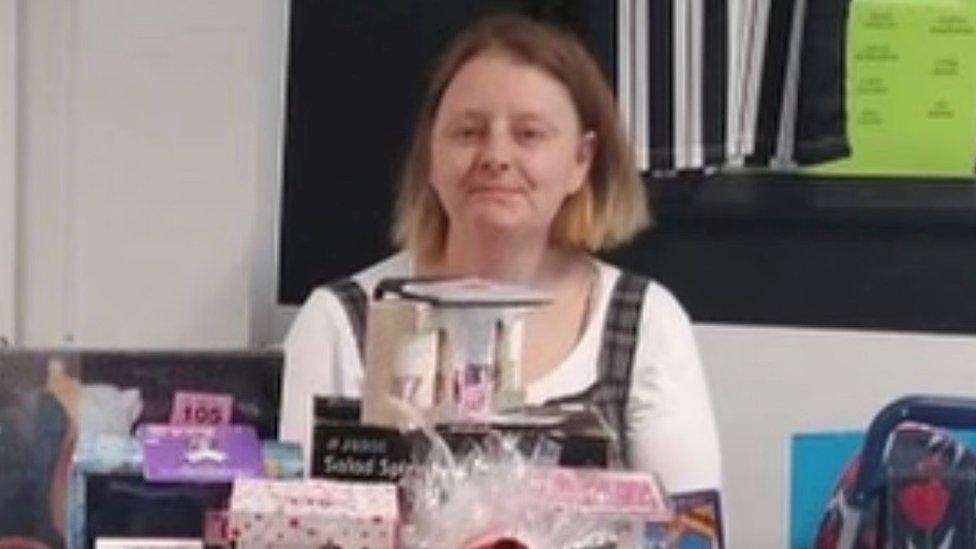Woman's suicide caused by mental health trust failures - coroner
- Published

Linda Banks had many contacts with mental health workers before her death
Failures at a mental health service contributed to a woman taking her own life, a coroner has said.
Linda Banks died in April 2022 from an overdose after weeks of contact with the Tees, Esk and Wear Valleys NHS Trust, who considered her low-risk.
County Durham assistant coroner Janine Richards said the trust did not see the 48-year-old as "genuine", and "wholly inappropriate" advice was given to her family to leave her alone.
Her loved ones said she was "let down".
The inquest previously heard Ms Banks, from Ferryhill, County Durham, had a history of mental illness which escalated dramatically in February 2022, as she struggled with the death of her mother, was stressing over financial issues and attempting to end her use of alcohol.
She repeatedly rang the trust's County Durham and Darlington crisis team, was hospitalised twice after taking overdoses and her family and GP also made regular calls to express their fears over her deterioration.

Linda Banks died in April 2022 after an overdose
However, after multiple assessments she was deemed a low risk of self harm, and her care plan relied on her getting bereavement counselling, and help with her alcoholism and benefits.
Ms Richards said there was a recurring theme in Ms Banks' care that clinicians repeatedly did not consider her distress and paranoia as "genuine", which led to an "under-estimation" of the risk she posed to herself.
The coroner said it was "abundantly clear" that Ms Banks' family and friends were "desperately concerned" about and "struggling to manage" her paranoia, failure to eat and drink and "bizarre behaviour", but her care was not escalated by assessors.
Ms Richards concluded the "actions and omissions" of the trust "contributed to her death more than minimally", and many of the systemic issues involved in her death were known about by the trust following a previous review.
'Tough love'
Ms Banks' brother, Jonathan Banks, said the family was "still hurting" and felt "very let down" by the trust.
He said his sister's behaviour "deteriorated massively" in the weeks before her death with her showing "severe paranoia" and refusing to leave her house.
"Over the last week of her life we were beside ourselves," he said, adding: "We were told she wasn't a danger to herself."
He said a mental health worker suggested they "leave her alone" and she was "doing this for attention", so the family "backed off" but her behaviour deteriorated further.
If you have been affected by any of the issues raised in this story you can visit BBC Action Line.
The trust has disputed that anyone gave the so-called "tough love" advice, but Ms Richards said she was "entirely satisfied" that while the details of what was said may be mistaken, advice with the "general import that family and friends should step was given".
Ms Richards said that was shown in part by the family "backing off" which, given how desperate they had been to get Ms Banks help, they would only have done if they had been following professional advice.
The coroner said the advice was "wholly inappropriate" but was "entirely in keeping with what clinicians believed about Linda's presentation and the assumptions being made", namely she was not genuine.

Who was Linda Banks?

Linda Banks was a dedicated fundraiser for mental health charities
Linda Banks was the "kindest of people" who "worked hard" raising money for various mental health charities.
She had experienced mental illnesses since a young age and wanted to "give something back" to help others in the same situation and "say thank you" for the help she had received, her cousin Karen Banks said.
Her family said she was "always a busy person" and her house was "littered with donations, gifts and prizes" for her next fundraisers, adding: "She always worked at least three tombolas ahead."
Peter Crawforth, her primary school teacher in Chilton and family friend, said she was the "most gentle child", a "very quiet but friendly girl" who he always thought was "fragile".
He said it was "readily apparent" from an early age she had learning difficulties but she "wanted to learn".
Mr Crawforth said she "loved her mother dearly" so it must have been a "dreadful blow" when she died.
Her brother Jonathan Banks said she always struggled to read and would get anxious when receiving letters, especially from officials, and needed them to be read and explained.
But she "lived life to the fullest every day" and "never let her learning difficulty hold her back", he said.
She loved music, had a talent for buying gifts and "gave so much without ever thinking of herself", he added.

A serious incident review found numerous failings, all of which the trust accepted, including:
An under-estimation of her risk of self-harm
Intensive home treatment would have been a reasonable intervention but that was not chosen
Her claims of hearing voices were not explored, and there were missed opportunities to look at the impact on her of previous traumas
She potentially had psychosis which was a red flag in terms of suicide prevention
Her family's concerns were dismissed and not listened to
A lack of awareness of her learning difficulties, which her family said should have been apparent
Aspects of her care may have been overshadowed by an assumption that she was trying to illicit attention
A lack of awareness of team processes meant Ms Banks did not receive the right care and her needs were not fully met
Not all her calls to crisis team were properly documented
Ms Richards said the trust carried out a thematic review in November 2021 after the deaths of four patients.
That found eight areas of failure, seven of which were still applicable at the time of Ms Banks' death five months later.
Ms Richards said the actions taken by the trust after that review were "ineffective" in preventing Ms Banks' death, adding she "did not receive the right care at the right time".
The trust said it had made significant improvements with "lessons learned", and the crisis team was no longer in special measures with chronic staff shortages as it had been at the time of Ms Banks' involvement.
Ms Richards said she accepted there had been "wholesale" changes at the trust, but she was concerned about their "timeliness" and the length of time it was taking for reviews of serious incidents to take place.
She said she intended to make a preventing future deaths report about the issue of reviews.

Follow BBC Tees on Facebook, external, X (formerly Twitter), , externaland Instagram, external. Send your story ideas to northeastandcumbria@bbc.co.uk, external.
Related topics
- Published22 November 2023

- Published21 November 2023
